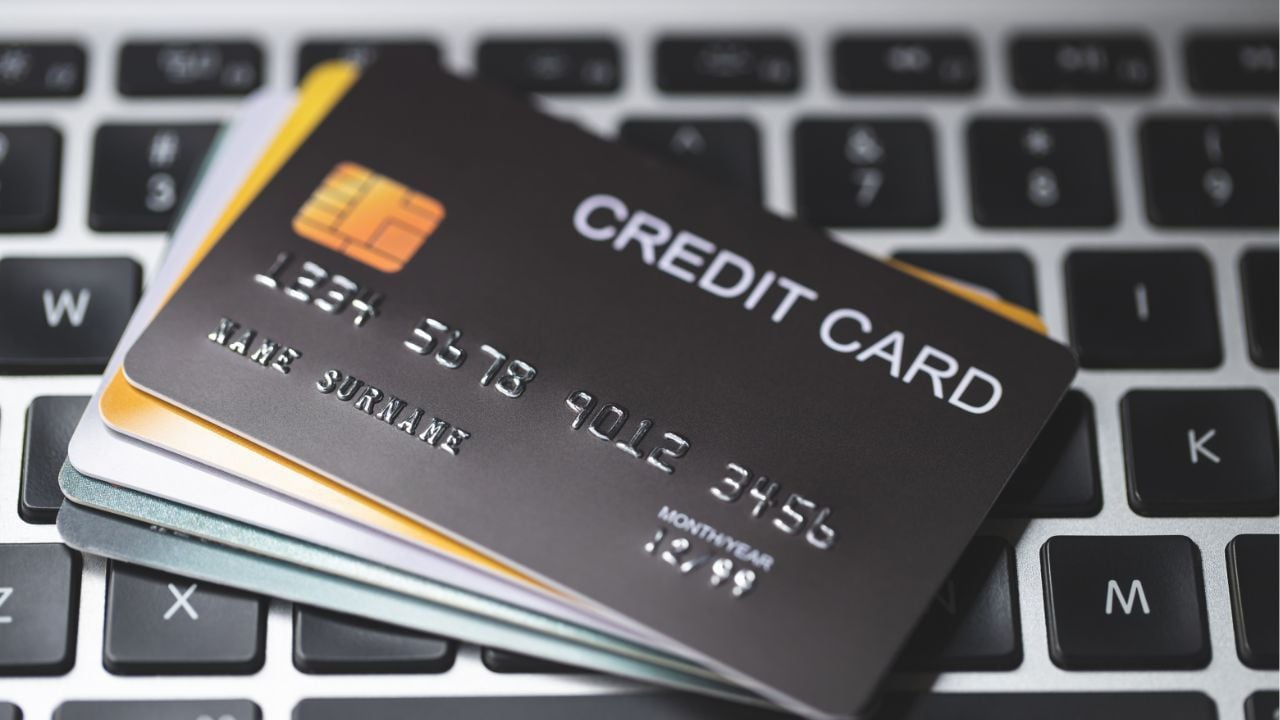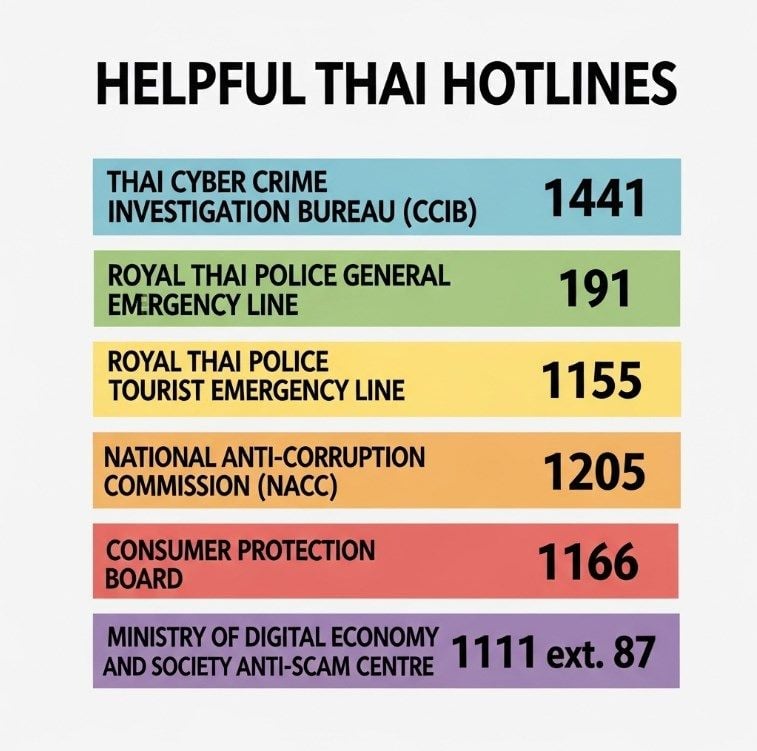

Phone scams are a common issue in Thailand, with fraudsters frequently impersonating police officers, bank staff, or other officials to deceive victims into handing over sensitive information or transferring money.
Just this morning, I had the mispleasure of accepting a call from a spoof number to hear a second of silence followed by an unfamiliar voice. It was unconvincing immediately but it gave me a thought of what would happen if this call were disguised to be from the bank, police, or any ministry.
These scams can be convincing, and scammers often exploit the trust people have in authority figures. Last year, in September, it was reported that a lot of people were calling in to the Nonthaburi Police Station claiming to have been contacted by some callers who were posing as police officers.
This influx of calls wanted to confirm that these scammers were legitimate; however, unfortunately, some have fallen victim to them, such as a Lamphun resident who lost 40,000 baht, a Chonburi resident who lost 1,999 baht, and even a Sakhon Nakhon victim who lost 90,000 baht.
It’s essential to stay vigilant if you receive a call from someone claiming to be an official. Here’s how to recognise the red flags, protect yourself, and respond safely.
Common scam scenarios from the so-called officials

There are several types of scams that you may encounter:
- Police Impersonation: You’re told that you’re under investigation for a crime and must transfer money to avoid arrest.
- Bank Fraud Warning: A fraudulent bank officer claims your account has suspicious transactions and demands immediate action.
- Package Held at Customs: A fake customs official tells you that you need to pay a fee to release a package or parcel.
- Government Threats: You’re falsely accused of being involved in illegal activities and pressured to send money to prove your innocence.
Red flags to watch out for
It’s important to recognise the warning signs that a call may be a scam. Watch out for these red flags:
- The caller claims to be from the police, bank, or embassy, but demands immediate action.
- They insist on secrecy, claiming that the situation is part of a “sensitive investigation”.
- You’re told to stay on the line and not speak to anyone else, increasing the sense of urgency.
- The caller asks you to transfer money, buy gift cards, or share personal or banking details.
- They may use fake badges, official-looking documents, or use government-style backgrounds on video calls to appear legitimate.
How to Respond

If you find yourself on the receiving end of a suspicious call, here’s what to do:
- Hang up immediately if you sense something isn’t right. Don’t engage with the caller any further.
- Never share personal or banking details over the phone, even if the caller seems convincing.
- Call back using official numbers: Always call back using the numbers found on your bank’s website or trusted government sources to verify the identity of the caller.
- Report suspicious calls: If you suspect a scam, contact the relevant Thai hotlines (listed below).
- If you’re uncertain, visit a physical bank branch or contact your local police station in person to verify the legitimacy of the call.
Tell-tale warning signs
The first major warning sign that a scam caller has reached you will be in the first few seconds of the call. Either you do not recognise the voice on the phone, or you were not expecting any phone calls. Sometimes, there will be a telltale silence before the caller starts introducing themselves, which is you being transferred to a caller (they usually work in gangs or full-fledged organisations.
However, you might be concerned that you are shutting off an important call especially when its coming from what is claimed to be an official person. If that’s the case, remember that you can always follow up through an official source (website, official phone number, etc.)
If you do decide to continue with the call, there are certain signs that who you are talking to may not be an official person after all. Many victims report feeling confused or rushed into action. Scammers may already know personal details about you, such as your full name, passport number, or address, which can make the call seem more credible.
Remember, legitimate officials in Thailand will never ask you to transfer money via phone calls. If something doesn’t feel right, trust your instincts and hang up. Scam callers rarely ever call twice or try to follow up.
Helpful Thai hotlines to contact

If you receive a suspicious call and need to verify, don’t hesitate to contact one of the following Thai hotlines:
- Thai Cyber Crime Investigation Bureau (CCIB): 1441
- Royal Thai Police General Emergency Line: 191
- Tourist Police Hotline: 1155
- National Anti-Corruption Commission (NACC): 1205
- Consumer Protection Board: 1166
- Ministry of Digital Economy and Society Anti-Scam Centre: 1111 ext. 87
What to do if you’ve been scammed
If you suspect that you have fallen victim to a call centre scam, it’s important to take immediate action to mitigate the damage and increase your chances of recovering losses:
- Report the scam immediately: As soon as you realise that you have been scammed, it’s time to take action, contact the emergency numbers listed (Thai Tourist Police at 1155 or the Anti-Online Scam Centre at 1441 might be your best chance) and report the crime. There’s no shame, don’t be hesitant, get the word out before it’s too late.
- Start protecting your finances: Considering that you may have provided your financial information to make a payment, you should immediately contact your bank and explain the situation. When you are in contact, you can request them to block future transactions and, if possible, inquire about recovering the funds through their fraud protection policies.
- Gather all of the evidence that you can: If you can, it is best to keep a record of all of the phone call logs, emails, texts, and documents that are related to the scam. This is necessary for authorities to take action and support you and in order for you to proceed in any legal action.
- Begin looking for legal advice: Chances of catching and finding the scammers are not as likely but in the event it happens, it’s great to have legal help ready to take legal action against the scammer. Furthermore, contacting a good lawyer who specialises in fraud cases can help give you the best course of action to help you recover your losses too.
Some tips to prevent future calls

In Thailand, unless you become a luddite, you will find it hard not to be contacted by scam callers every now and then. How it works is that your number and personal information have either been bought or extracted from another party, whether it’s some shady figure on the dark web or an actual official person like this Thai bank loan officer in Nonthaburi.
One key point of weakness is that we live in a society where there are cashless transfers, subscriptions to services, memberships, discounts, and having to give your information to any event or activity that you do. That means your phone number is out there and the more we sign up for, the more susceptible we become to the influx of calls.
There are some key ways you could prevent future incidents, and these are not limited to:
- Changing your phone number: If you feel like too many calls are coming in and you are not secure, you can always change your SIM card and phone number for a fresh start. Be sure to let other companies, people, or anyone who might need to call you know about the change.
- Reduce giving out your information: Unless it is absolutely necessary, you are not forced to have to hand over your personal details and phone number (unless it is a bank, official government, or hospital, for example). You can reduce the number of calls you get by reducing the amount of information you give out.
- Block phone numbers: After you have hung up on a scam caller, it is suggested that you block the number to reduce the number of fraudulent calls you will get.
- Report to the organisation or authorities: You may follow up with a report to the bank, police station, or government organisation to allow them to act or at least verify that it was not them who called you.
- Use apps to avoid scam calls: You can use apps such as Whoscall that will display the identity of the person calling you and will let you know if they are a scammer based on community reporting.
If you receive a suspicious call, stay calm. Scammers rely on fear and urgency to manipulate you into acting quickly. If in doubt, simply hang up and contact a trusted authority.
Share this information with friends and family, especially those who may be more vulnerable, such as the elderly. Awareness is your first line of defence against these scams. Always remember to take the time to verify before making any decisions, especially when it involves your personal or financial information.
The story Received a scam call from a ‘bank staff’ or ‘police officer’? Here’s what you should do as seen on Thaiger News.
